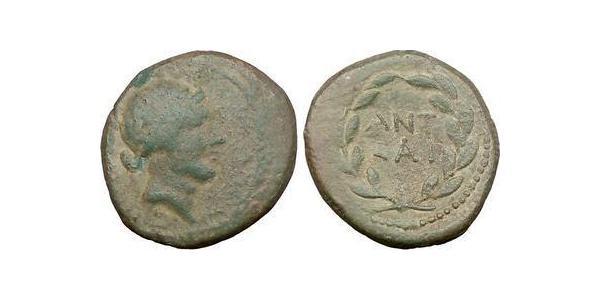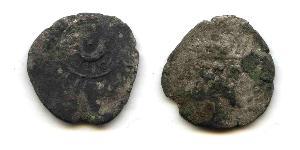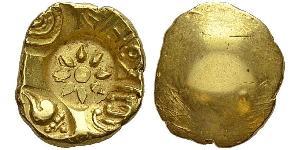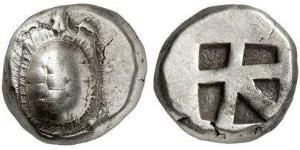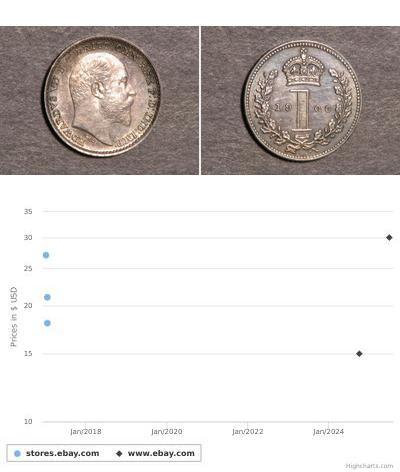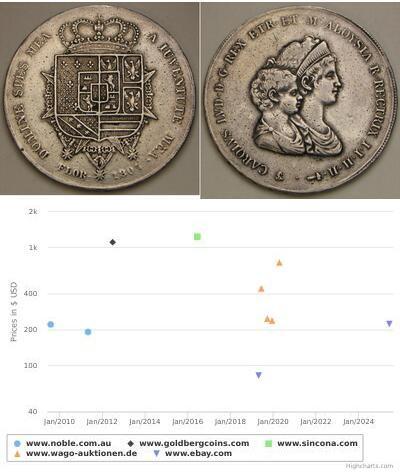[ 1913] Mark Antony and Octavian Leaded bronze (24mm, 9.12 gm.), Macedonia, Thessalonica , 37 B.C. Very Rare. Reference: RPC 1552; SNG Copenhagen 375. Diademed head of Agonothesia right. ANT/KAI, legend in two lines in wreath. Provided with Certificate of Authenticity. CERTIFIED AUTHENTIC by Sergey Nechayev, PhD - Numismatic Expert Marcus Antonius (in Latin: M·ANTONIVS·M·F·M·N) (c. January 14, 83 BC–August 1, 30 BC), known in English as Mark Antony, was a Roman politician and General. He was an important supporter and the loyal friend of Gaius Julius Caesar as a military commander and administrator, being Caesar's second cousin, once removed, by his mother Julia Antonia. After Caesar's assassination, Antony formed an official political alliance with Octavian (Augustus) and Marcus Aemilius Lepidus, known to historians today as the Second Triumvirate. The triumvirate broke up in 33 BC. Disagreement between Octavian and Antony erupted into civil war, the Final War of the Roman Republic, in 31 BC. Antony was defeated by Octavian at the naval Battle of Actium, and in a brief land battle at Alexandria. He committed suicide, and his lover, Cleopatra, killed herself shortly thereafter. Augustus (Latin: IMPERATOR·CAESAR·DIVI·FILIVS·AVGVSTVS; 23 September 63 BC – 19 August AD 14), born Gaius Octavius Thurinus, was adopted by his great-uncle Julius Caesar in 44 BC, and between then and 27 BC was officially named Gaius Julius Caesar Octavianus. After 27 BC, he was named Gaius Julius Caesar Augustus. Because of the various names he bore, it is common to call him Octavius when referring to events between 63 and 44 BC, Octavian (or Octavianus) when referring to events between 44 and 27 BC, and Augustus when referring to events after 27 BC. He became the first emperor of the Roman Empire, which he ruled alone from 27 BC until his death in AD 14. The young Octavius came into his inheritance after Caesar's assassination in 44 BC. In 43 BC, Octavian joined forces with Mark Antony and Marcus Aemilius Lepidus in a military dictatorship known as the Second Triumvirate. As a triumvir, Octavian ruled Rome and many of its provinces as an autocrat, seizing consular power after the deaths of the consuls Hirtius and Pansa and having himself perpetually re-elected. The triumvirate was eventually torn apart under the competing ambitions of its rulers: Lepidus was driven into exile, and Antony committed suicide following his defeat at the Battle of Actium by the fleet of Octavian commanded by Agrippa in 31 BC. After the demise of the Second Triumvirate, Octavian restored the outward facade of the Roman Republic, with governmental power vested in the Roman Senate, but in practice retained his autocratic power. It took several years to work out the exact framework by which a formally republican state could be led by a sole ruler; the result became known as the Roman Empire. The emperorship was never an office like the Roman dictatorship which Caesar and Sulla had held before him; indeed, he declined it when the Roman populace "entreated him to take on the dictatorship". By law, Augustus held a collection of powers granted to him for life by the Senate, including those of tribune of the plebs and censor. He was consul until 23 BC. His substantive power stemmed from financial success and resources gained in conquest, the building of patronage relationships throughout the Empire, the loyalty of many military soldiers and veterans, the authority of the many honors granted by the Senate, and the respect of the people. Augustus' control over the majority of Rome's legions established an armed threat that could be used against the Senate, allowing him to coerce the Senate's decisions. With his ability to eliminate senatorial opposition by means of arms, the Senate became docile towards his paramount position. His rule through patronage, military power, and accumulation of t ...
type to read more

|
Posted by:
anonymous 2015-08-19 |
Similar Coin Groups
2025-06-14
- Historical Coin Prices
2025-05-23
- Historical Coin Prices
You may be interested in ...

